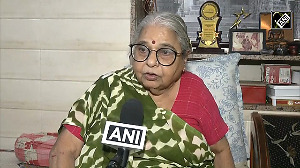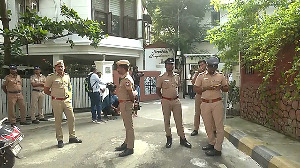While the Maharashtra government seems keen on ratifying the ban on dance bars, it may be some time before bargirls actually have to hunt for alternative professions.
Governor S M Krishna's returning the dance bar ordinance without signing on the dotted line could be an indication of the problems the government could face in getting the new law in place.
The controversial ordinance will now come up for discussion in the monsoon session of legislative assembly which begins on July 11.
Here's what could happen to the Bombay Police (Amendment) Ordinance, 2005 once the debate shifts from editorial rooms, beer parlours and local trains to the assembly.
For any Bill to become law it must first be discussed and passed by the legislative assembly and the legislative council, after which the lower House sends it to the governor for approval.
The governor can return it to the assembly with objections. If the assembly sends it back to the governor, he has no option but to give his nod. It is then sent to the President for final approval.
Even when the assembly is not in session, the government can draft an ordinance with the approval of the Cabinet and send it to the governor for his signature if it considers that the matter is urgent.
The Congress-Nationalist Congress Party government adopted this method in the case of the dance bar ordinance. But the governor returned it saying that he did not feel it was urgent and that it could wait till the session opens.
The NCP doesn't envisage any problem once the Bill comes for voting. Ruling partners NCP and Congress command 140 out of 288 members in the lower House. With support from their coalition partners and Independent sympathisers, the number could go up to 150 -- enough to see the Bill through.
The BJP too has expressed its willingness to back the Bill. BJP state leader Vinod Tawade said, "Our party will support the ordinance in the assembly, we want a ban on dance bars."
While the ruling coalition in Maharashtra theoretically has the numbers to pass the ordinance, discussion on how exactly 75,000 bar girls will be rehabilitated may lead to a prolonged battle in the lower House.
The dance bar ordinance could hang fire for the simple reason that there is no time limit on discussions on Bills in the Lower House; and the issues dogging this Bill are many, chief among them being rehabilitation of the dancers.
As of now, there is no mutual understanding between Congress and NCP on the issue. The NCP wants to hurry through the Bill, but the Congress state leadership would not want to seem going against the wishes of the high command.
Bharatiya Bargirls Union chief Varsha Kale is on record saying: "Congress president Sonia Gandhi supported our stand, and promised that she would ask state government to rehabilitate bar girls before closing down bars."
Congress leader Girija Vyas, who is also president of the National Commission of Women, on Friday welcomed Governor S M Krishna's move to return the ordinance saying that rehabilitation should happen before the ban is sanctioned.
Only time will tell whether the Congress and NCP are successful in arriving at a common position before the Bill is introduced in the assembly. The lower House of the Maharashtra legislature is in for a stormy monsoon session.





